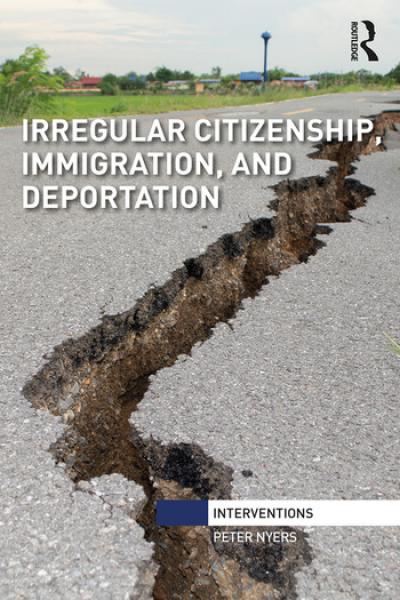Guest post by Dr. Julija Sardelić. Julija is a Lecturer in Political Science and International Relations at the Victoria University of Wellington in New Zealand. Her research broadly examines citizenship and migration, with a particular focus on the social position of marginalized minorities and migrants. She is on Twitter @JulijaSardelic.
Review of Irregular Citizenship, Immigration and Deportation By Peter Nyers (Routledge 2018)

By the ‘irregularization of citizenship’, Nyers intends on emphasizing that ‘[c]itizenship can be legally rescinded or formally revoked; but it can also be unmade by being made unworkable’ (23). Further, for Nyers, ‘…irregular citizenship is not a static identity, but an activity and a process that requires dynamic creative energy to achieve this unmaking of citizenship. People are not irregular; they are made irregular – irregularized – by power relationships (including the relations of struggle) that are the subject of investigation in this book’ (23).
Through this investigation, he does not focus on irregular migrants, but rather shifts his attention to citizens who become irregularized by state intervention. It might initially seem counterintuitive, but Nyers argues that states do not use their powers to irregularize only migrants but also their own citizens. As such, in liberal democratic states, citizenship status does not in fact guarantee protection from deportation, and further, these states may deny their citizens a basic right that every citizen is generally thought to have – the right to return to one’s own country. Thus the novel contribution of Nyers’ book is that he transfers the discussion on irregularization from migrant status to citizen status, and hence, points out that there is no longer any status in today’s liberal democracies that is not subject to irregularization.
Nyers’ book seeks to answer the main question ‘What irregularization processes do liberal democratic states use to get rid of citizens they no longer wish to have a connection with?’ He finds that usually this boils down to states creating harsh conditions where citizens can no longer claim their citizenship rights. In each chapter he introduces examples of citizenship irregularization ‘acts’ – performative processes where states unmake the citizenship of certain US and Canadian citizens.
In the first act, Nyers analyses the situation of ‘unwanted citizens’, such as Canadian citizen Deepan Budlakoti, who was born in Canada and who therefore on the basis of the jus soli principle, was granted citizenship. While Budlakoti was in prison however, the Canadian Government decided he was not worthy of being protected as a citizen. He was transported from a prison facility to a migration detention centre and became subject to deportation. In the second act, Nyers talks about ‘abandoned citizens’. Here Nyers examines the position of Canadian citizen Abousfian Abdelrazik who, while visiting family in Sudan, occupied the Canadian embassy in Sudan as a form of protest, and in response was denied formal legal protection by the Canadian government. He was falsely accused of terrorism and subsequently put in prison in Sudan. Canada further abandoned him by denying him the right to return to his own country, Canada. Further acts described the notion of ‘accidental citizens’ or people who obtained citizenship through the application of the jus soli principle, but who later participated in terrorist groups. As a result, these individuals were either executed by the U.S. army or asked to denounce their citizenship. The state formally considered them as people who should never have obtained citizenship in the first place - people who received it ‘by accident’. Therefore, despite being citizens, they were irregularized rather than protected, and in many cases faced death as a result.
However, Nyers also argues that citizens who are irregularized do still claim their rights as citizens even when they are denied them. Additionally, he finds that protest and solidarity movements have the power to dismantle irregularizing processes, and that for instance, petitioning for irregular citizens to be returned to their home countries has been successful.
Nyers concludes by outlining potential future research on irregular citizenship by discussing the rights of First Nations people with regards to deportation. In a Canadian court ruling in the case Sandy Bay Ojibway First Nation v. Minister of Citizenship and Immigration, attorneys argued that First Nation members cannot be deported despite not having Canadian citizenship. While the Canadian Court did not decide in favour of such argumentation, a similar debate on the rights of Aboriginal people has recently occurred in Australia where the High Court in Love and Thoms v. Commonwealth decided that Aboriginal non-citizens are not aliens and thus cannot be deported. Because of their connection to Australia, which is far older than to the current political regime founded on colonialism, they could not be irregularized as migrants.
While one might argue that his theory is built on exceptional cases, Nyers notes that these cases actually show the ruptures in liberal democratic citizenship, which should be equally inclusive of all citizens. I would also add that there is a growing number of cases confirming his theory of irregular citizenship, including cases when states strip citizenship from individuals who militarily fight with foreign enemy organizations and cases when Roma EU citizens are deprived of the right to free movement – something that I examine in my own research.
Nyers’ book on ‘Irregular Citizenship’ is brilliant and trailblazing, and I believe it will light the path for many future academic inquiries, as well as open broader public debates. The book’s clear writing and innovative structure in both content and form focused around individualised “acts” of citizenship irregularization, make the book accessible to the broader public beyond citizenship and migration studies scholars.
Any comments about this post? Get in touch with us! Send us an email, or post a comment here or on Facebook. You can also tweet us.
__________
How to cite this blog post (Harvard style)
Sardelić, J. (2021). Book Review: Irregular Citizenship, Immigration and Deportation. Available at: https://www.law.ox.ac.uk/research-subject-groups/centre-criminology/centreborder-criminologies/blog/2021/01/book-review [date]
Share:








